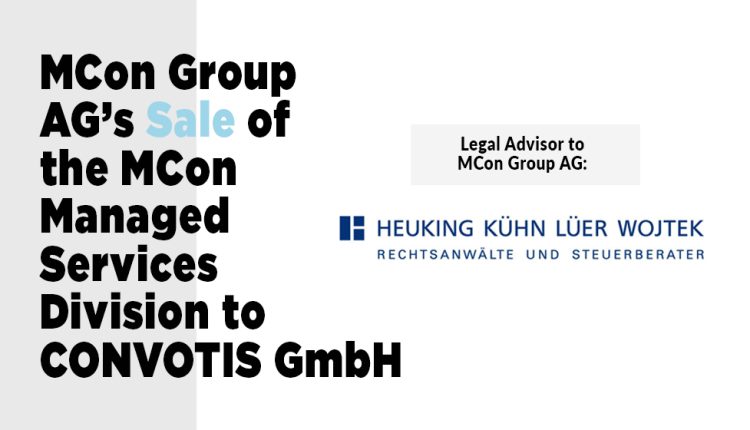MCon Group AG’s Sale of the MCon Managed Services Division to CONVOTIS GmbH
Heuking Kühn Lüer Wojtek advised MCon Group AG on the sale of the MCon Managed Services division to CONVOTIS Group.
MCon Group was founded in St Gallen in 2010 in St. Gallen, and the bulk of its business comprises three pillars: digital, data-driven solutions for increasing the value of sales and after-sales business, professional services for the design and implementation of digital solutions, and IT infrastructure and hosting. These branches are facilitated by 24/7 support capacity. The company has also been active in Asia for more than 10 years, with a particularly strong presence in China. The MCon Managed Services division, which also includes MCon’s German and Moroccan subsidiaries, offers infrastructure-as-a-service services for customers from numerous industries, including the automotive industry.
CONVOTIS Group is a leading provider of innovative and high-quality business solutions and managed IT services in Germany, Austria and Switzerland. Its three areas of expertise are business solutions, digital platform solutions and managed IT services, with the firm operating as a strategic IT partner for its customers when it comes to increasing growth and efficiency through digitisation.
Heuking Kühn Lüer Wojtek’s Munich M&A practice advised MCon Group AG with a team led by Dr Mathias Schröder.
An Interview with Dr Mathias Schröder at Heuking Kühn Lüer Wojtek
Can you tell us more about your team’s work as part of this sale?
My M&A team is very experienced in such cross-border transactions. Initially, our task was to coordinate with the buy side on how to structure the transaction, especially in view of the fact that one target was a German company and the other Moroccan. Since the Moroccan company was a subordinate part of the deal in economic terms, we favoured a German transaction overall, which also included the transfer of the Moroccan shares. The transfer of shares, which was subject to mandatory Moroccan law, as well as other issues of Moroccan law, were then accompanied by our Moroccan partner law firm.
We also assisted the client in filling the data room. In particular, care must be taken to ensure that only information is disclosed without committing legal violations. Otherwise, our main activity was the negotiation of a purchase agreement and the coordination with the Moroccan colleagues. In such cross-border transactions, it is particularly important that the coordination is well-organised and that one brings in partners upon whom one can rely. Particularly in legal systems that do not meet all European standards, one must be prepared for special features.
What made the MCon Managed Services division an attractive prospect for purchase by CONVOTIS Group?
The target is an IT service provider company in the managed services sector. At the moment, we are seeing an overwhelmingly large number of deals from the software sector, including managed service providers. In this respect, there were a number of interested parties.
In this specific case, the target was an ideal fit for the strategy of the shareholder of the target, a German private equity fund.
Did you encounter any major obstacles during your work on this deal? How did you overcome them?
The transaction has proceeded absolutely professionally and without major obstacles as far as its essential part is concerned. However, as described, the deal also included a Moroccan subsidiary, which was also transferred to the buyers. Towards the end of the transaction, some peculiarities arose that even an experienced M&A team could not necessarily expect.
These involved specific legal conditions but also more cultural issues. One example is that Morocco does not recognise apostilles despite being a member of the Hague Convention of 5 October, 1961. Equally surprising for us were legal provisions that have to be observed when founding companies in Morocco. As far as the share capital is not paid in the local currency, there are restrictions with regard to future profit distributions. Finally, the speed of dealing with service providers or local authorities is different from what we are used to. Postal deliveries, for example, can take an exceptionally long time; the same applies to inquiries at banks or authorities.
Forward-looking organisation is therefore a mandatory condition in order to complete the transaction successfully. This has been achieved here.




